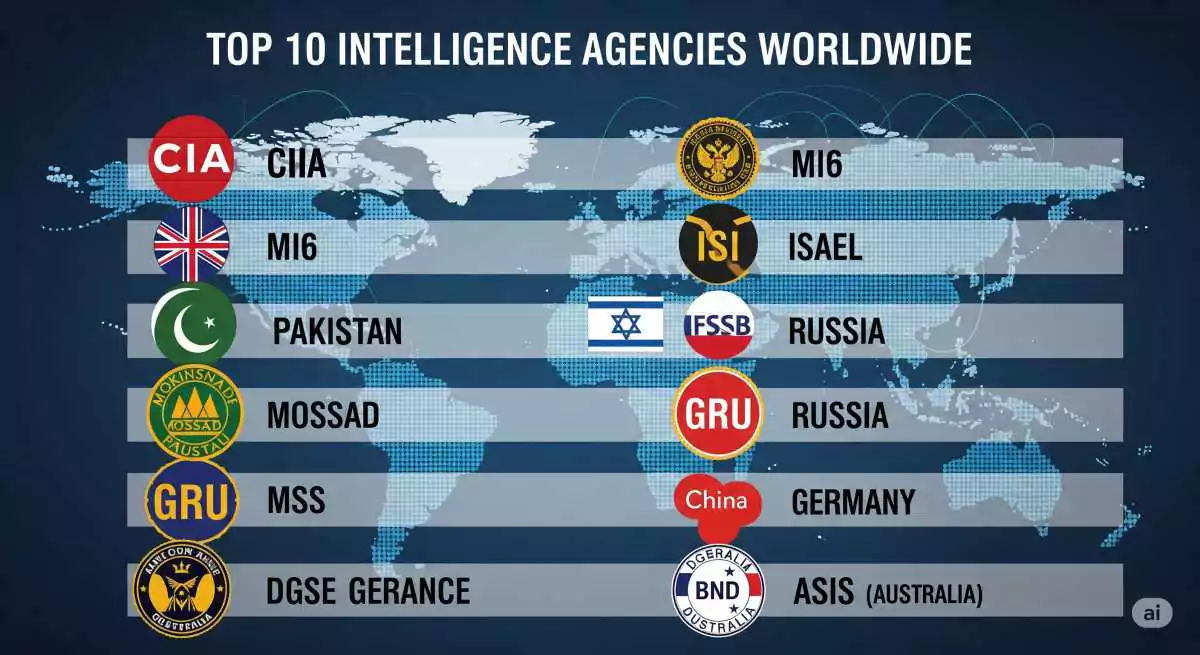Intelligence agencies play a crucial role in safeguarding national security, gathering critical information on foreign threats, and conducting covert operations to protect their countries' interests. These organizations operate in the shadows, employing advanced technology, human intelligence, and strategic analysis to counter terrorism, espionage, and geopolitical challenges. Rankings of the world's top intelligence agencies are subjective and based on factors like operational success, global reach, technological capabilities, and historical impact. This article compiles a list of the top 10 based on recent assessments from reliable sources as of 2025, providing detailed insights into each agency's history, structure, and notable achievements.
While no official global ranking exists, this list draws from expert analyses, considering agencies' influence in international affairs. Let's explore the top 10 intelligence agencies in the world.
What Makes an Intelligence Agency Powerful?
Before diving into our rankings, it's essential to understand the criteria that define a world class intelligence agency:
- Global Reach: Ability to operate across multiple continents
- Budget and Resources: Financial backing and technological infrastructure
- Human Intelligence (HUMINT): Network of agents and informants
- Signals Intelligence (SIGINT): Electronic surveillance capabilities
- Analytical Capabilities: Processing and interpreting vast amounts of data
- Counterintelligence: Protecting national secrets and assets
- Technological Innovation: Advanced tools and methodologies

1. Central Intelligence Agency (CIA) - United States
Founded in 1947 and headquartered in Langley, Virginia, the CIA is widely regarded as the premier intelligence agency globally due to its vast resources, technological prowess, and extensive international network. With an estimated budget exceeding $15 billion and over 21,000 employees, the CIA focuses on foreign intelligence gathering, covert operations, counterterrorism, and cyber espionage.
Key responsibilities include analyzing global threats, supporting U.S. foreign policy, and conducting paramilitary actions. Notable operations encompass the 1953 Iranian Coup (Operation Ajax), the Bay of Pigs Invasion, the 2011 raid on Osama bin Laden (Operation Neptune Spear), Cold War espionage against the Soviet Union, and modern drone strikes in the Middle East. The agency's advanced surveillance tools and alliances, such as the Five Eyes network, enhance its effectiveness in combating emerging threats like cyberattacks and terrorism.
2. Secret Intelligence Service (MI6) - United Kingdom
Established in 1909 and based in London, MI6 (officially the Secret Intelligence Service) is one of the oldest intelligence agencies, specializing in foreign espionage, counterterrorism, and cyber intelligence. Operating under the Foreign, Commonwealth & Development Office, it has a dedicated counterterrorism budget of around $2.6 billion.
MI6 recruits agents worldwide to gather human intelligence (HUMINT) and disrupt threats beyond UK borders. Iconic operations include cracking the Enigma code during World War II, the Double Cross System to deceive Nazi Germany, Cold War infiltrations of Soviet networks, surveillance of Iran's nuclear program, and support in anti ISIS campaigns. Its collaboration with allies like the CIA underscores its role in global security.
3. Mossad - Israel
Mossad, founded in 1949 and headquartered in Tel Aviv, is Israel's elite foreign intelligence agency, renowned for its precision in counterterrorism, sabotage, and covert assassinations. Reporting directly to the Prime Minister, it employs around 7,000 personnel and focuses on neutralizing threats to Jewish interests worldwide.
The agency excels in high-risk operations, such as the 1960 capture of Nazi war criminal Adolf Eichmann in Argentina, Operation Wrath of God (retaliation for the 1972 Munich Olympics massacre), the 2007 bombing of a Syrian nuclear reactor (Operation Orchard), and disruptions to Iran's nuclear program through targeted killings. Mossad's motto, "By way of deception, thou shalt do war," reflects its strategic use of deception and cyber tools.
4. Federal Security Service (FSB) - Russia
The FSB, successor to the KGB, was established in 1995 and is headquartered in Moscow's Lubyanka Square. It handles domestic security, counterintelligence, border protection, and cyber operations, with a strong emphasis on internal surveillance under Kremlin control.
With tens of thousands of agents, the FSB combats terrorism, espionage, and political dissent. Key operations include interventions in the Second Chechen War, alleged cyber interference in Western elections, the arrest of opposition figures like Alexei Navalny, and intelligence support in the Ukraine conflict. Its SVR counterpart manages foreign intelligence, making Russia a formidable player in global espionage.
5. Ministry of State Security (MSS) - China
Founded in 1983 and based in Beijing, the MSS is China's primary intelligence agency, overseeing both internal and external security with a focus on cyber espionage and economic intelligence. It employs advanced hacking units and monitors dissidents, reflecting China's growing geopolitical ambitions.
Notable activities include the APT 10 cyber campaigns targeting U.S. technology, infiltration of foreign universities for IP theft, surveillance during Hong Kong protests, and operations in Taiwan. The MSS's vast network supports China's Belt and Road Initiative and counters Western influence.
6. Research and Analysis Wing (RAW) - India
RAW, established in 1968 and headquartered in New Delhi, is India's external intelligence arm, specializing in counterterrorism, regional surveillance, and advising on foreign policy. It focuses on South Asia, with operations often covert and strategic.
Key achievements include intelligence support for the 1971 Bangladesh Liberation War, Operation Smiling Buddha (India's first nuclear test), surveillance during the Kargil War, and activities in Balochistan. RAW's growing cyber capabilities enhance its role in countering threats from Pakistan and China.
7. Inter Services Intelligence (ISI) - Pakistan
Founded in 1948 and based in Islamabad, the ISI is Pakistan's military linked intelligence agency, known for its influence in national security and foreign affairs, particularly in Afghanistan and India. With about 10,000 personnel, it excels in counterintelligence despite resource constraints.
Prominent operations include aiding Mujahideen against the Soviets in Afghanistan, tactical support in the Kargil conflict, monitoring Taliban and Al Qaeda, and proxy activities in Kashmir. The ISI's "double game" strategies have drawn international scrutiny but underscore its regional power.
8. Bundesnachrichtendienst (BND) - Germany
The BND, formed in 1956 and headquartered in Berlin, is Germany's foreign intelligence service, emphasizing electronic surveillance, counterterrorism, and international cooperation. With over 6,000 agents, it operates under the Chancellor's Office and partners with the NSA.
Notable efforts include Cold War monitoring of the Soviet Union, Operation Rubicon (code-breaking with the CIA), post 9/11 Islamist tracking, and intelligence in the Ukraine Russia war. The BND's tech focus makes it vital in Europe's security landscape.
9. Directorate General for External Security (DGSE) - France
Established in 1982 and located in Paris, the DGSE manages France's external intelligence, covert operations, and cyber defense, with over 5,000 agents and 10 military satellites the most in Europe.
Key operations include the controversial sinking of the Rainbow Warrior in 1985, anti-terror efforts in Africa's Sahel region, infiltrating Al-Qaeda, and preventing over 15 attacks in France since 2001. Its global network supports French interests in Africa and the Middle East.
10. Australian Secret Intelligence Service (ASIS) - Australia
ASIS, founded in 1952 and headquartered in Canberra, focuses on foreign intelligence in the Asia-Pacific, protecting Australia's economic and political interests as part of the Five Eyes alliance. With a 2023, 24 budget of about $482 million, much of its work remains classified.
Notable activities include espionage during East Timor's independence, counterterrorism in Southeast Asia, the 2021 Kabul airlift, and joint missions with the CIA and MI6. ASIS's regional expertise is crucial amid rising tensions in the Indo Pacific.
Comparison Table of Top 10 Intelligence Agencies
| Rank | Agency | Country | Founded | Headquarters | Key Focus Areas |
|---|---|---|---|---|---|
| 1 | CIA | USA | 1947 | Langley, VA | Covert ops, cyber, global surveillance |
| 2 | MI6 | UK | 1909 | London | Espionage, counterterrorism |
| 3 | Mossad | Israel | 1949 | Tel Aviv | Counterterrorism, assassinations |
| 4 | FSB | Russia | 1995 | Moscow | Internal security, cyber interference |
| 5 | MSS | China | 1983 | Beijing | Cyber espionage, economic intel |
| 6 | RAW | India | 1968 | New Delhi | Regional surveillance, counterterrorism |
| 7 | ISI | Pakistan | 1948 | Islamabad | National security, proxy operations |
| 8 | BND | Germany | 1956 | Berlin | Electronic surveillance, alliances |
| 9 | DGSE | France | 1982 | Paris | Covert ops, satellite intel |
| 10 | ASIS | Australia | 1952 | Canberra | Asia Pacific focus, alliances |
Conclusion
The world's top intelligence agencies represent the pinnacle of national security capabilities. Each organization brings unique strengths, operational philosophies, and regional expertise to the global intelligence landscape. As threats continue to evolve in the 21st century, these agencies must adapt while maintaining their core mission of protecting national interests and international security.
Understanding the role and capabilities of these intelligence organizations provides valuable insight into global security dynamics and the complex challenges facing modern nations. While much of their work remains classified, their public profiles demonstrate the critical importance of intelligence in maintaining international stability and security.
The ranking of intelligence agencies reflects not just their current capabilities but also their ability to adapt to emerging threats and technological challenges. As we move forward, these organizations will undoubtedly continue to evolve, innovate, and collaborate in their ongoing mission to protect national and international security interests.
Disclaimer
This article provides educational information about intelligence agencies based on publicly available sources and expert analysis. All information presented is for informational purposes only.





